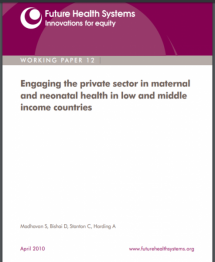Engaging the Private Sector in Maternal and Neonatal Health in Low and Middle Income Countries
This working paper discusses the need/importance of engaging the private sector. It also presents a review of evidence around strategies and modalities that are implemented in, by, or through the private sector to improve maternal health outcomes.
The strength of the evidence is evaluated and recommendations are made for logical entry points where donors and governments can encourage engagement by the private sector in maternal and neonatal health.
This paper reviews family planning initiatives as well as the literature on efforts to train private sector health workers in maternal health. Community based misoprostol programs play a special role in altering the traditional limitations of training. In addition to interventions, the paper reviews strategies to accommodate private sector incentives.
The paper concludes by discussing key principles for donors to consider in engaging with the private sector to improve the safety and quality of private sector maternal and neonatal health care in low and middle income countries.
Last modified: March 25, 2019
Language: English

